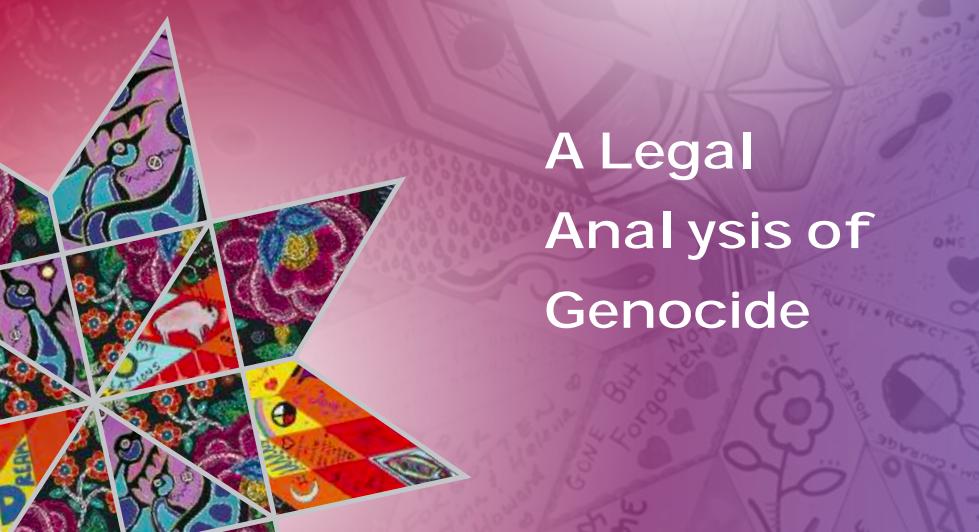5 June 2019 – On Monday, the Final Report of the National Inquiry into Missing and Murdered Indigenous Women and Girls (MMIWG) was made public at an official ceremony held in Ottawa. This report, which affirms that First Nations, Inuit and Metis are victims of genocide, is supported by a supplementary legal analysis produced to deal specifically with this issue.
The use of the term “genocide,” entailing far-reaching legal and political consequences, had a resounding impact within Canada and abroad. On Tuesday, Prime Minister Justin Trudeau accepted the use of the term “genocide” during the 2019 Women Deliver Conference in Vancouver. He had also pronounced that word the day before in his opening speech at this conference, but without officially accepting it.
The legal analysis supporting the MMIWG’s findings was elaborated in consultation with international legal scholars and lawyers with expertise on genocide and international crimes, including CPIJ members, namely Fannie Lafontaine (CPIJ Director), Amanda Ghahremani (Co-Researcher) and Catherine Savard (Assistant Coordinator).
 The supplementary legal analysis on genocide contains the National Inquiry’s legal basis for determining that Canada has committed genocide against Indigenous Peoples. This analysis focuses on the responsibility of Canada as a state, and not on the responsibility of individuals. It explains that Canada’s genocide of Indigenous peoples was perpetrated through colonial structures and policies maintained by the Canadian state through centuries up until now. More precisely, it is the Canadian government’s actions and omissions, taken as a whole, that constitute this genocide. They imply the responsibility of the Canadian state under international law.
The supplementary legal analysis on genocide contains the National Inquiry’s legal basis for determining that Canada has committed genocide against Indigenous Peoples. This analysis focuses on the responsibility of Canada as a state, and not on the responsibility of individuals. It explains that Canada’s genocide of Indigenous peoples was perpetrated through colonial structures and policies maintained by the Canadian state through centuries up until now. More precisely, it is the Canadian government’s actions and omissions, taken as a whole, that constitute this genocide. They imply the responsibility of the Canadian state under international law.
This MMIWG’s legal analysis insists on the fact that, contrary to the popular understanding, genocide encompasses both lethal and non-lethal acts, including acts of “slow death”, i.e., not leading to immediate death. In the Canadian colonial context, the intent to destroy Indigenous peoples was implemented gradually and intermittently through various policies targeting the distinct Indigenous communities. These policies compromised Indigenous peoples’ rights to life and security, as well as numerous economic, social and cultural rights. If such non-lethal acts differ from the traditional reductionist narrative on genocide, which is based on the Holocaust model, they are nonetheless included in the definition enshrined in Article 2 of the Convention on the Prevention and Punishment of the Crime of Genocide.
The MMIWG analysis concludes that the Canadian violation of international law will continue as long as genocidal acts continue to occur and that destructive policies are upheld by the Canadian government. Under international law, Canada has a duty to remedy the harm caused, but first, it must put an end to the persistent manifestations of violence and oppression of Indigenous peoples. Ending this genocide and providing appropriate remedies requires the implementation of an honest and dynamic process to decolonize and indigenize Canadian structures, institutions, laws and policies, thus involving the full and timely implementation of the MMIWG Calls for Justice.
The MMIWG is a National Commission of Inquiry set up in September 2016 and charged with the mandate to examine and report on the systemic causes of all forms of violence against Indigenous women and girls and 2SLGBTQQIA individuals in Canada. Its work led to the conclusion that Canada’s genocide of Indigenous peoples constitutes a root cause of the violence perpetrated against Indigenous women, girls and 2SLGBTQQIA individuals.
The supplementary legal analysis of genocide is available in English and French.
The MMIWG’s Final Report is available here:
- Volume 1a: English version and French translation;
- Volume 1b: English version and French translation;
- Volume 2 (supplementary report on Quebec): French version and English translation.
—
* The acronym 2SLGBTQQIA refers to two-spirit, lesbian, gay, bisexual, transgender, queer, questioning, intersex and asexual persons.

